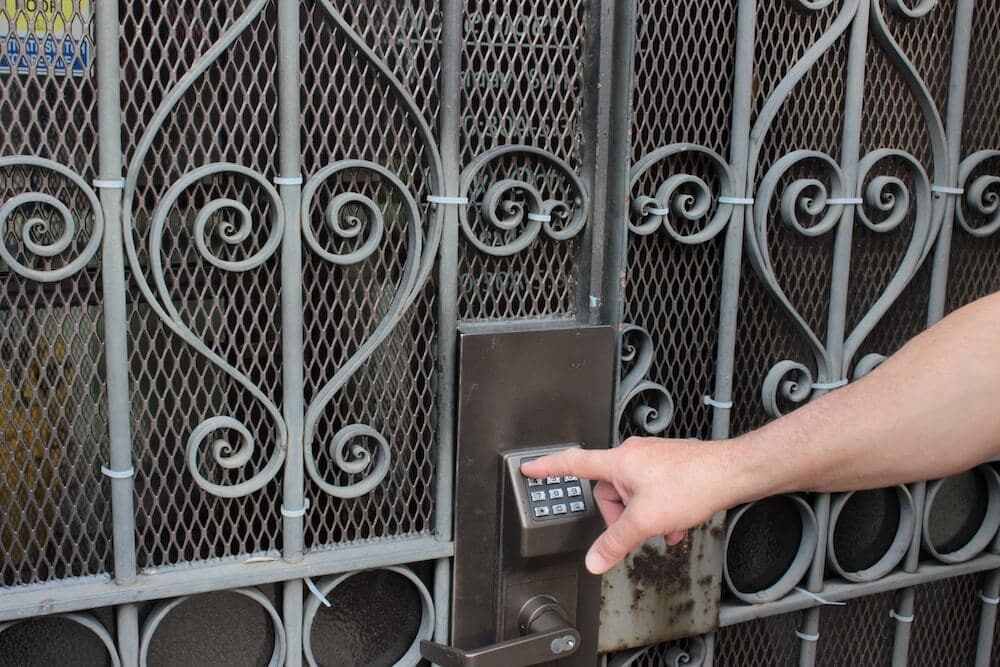
Collaboration is vital in today’s business world, and shared calendars play a key role in keeping teams organized. However, managing permissions within shared calendars is crucial for data security and effective teamwork. GroupCal’s advanced permissions management system provides businesses with greater control and flexibility over calendar access, promoting seamless collaboration and increased productivity. In this article, we’ll explore the importance of permission management in shared calendars and how GroupCal‘s solution benefits businesses.
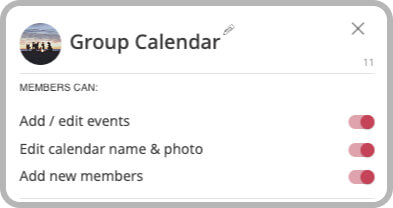
Understanding Permissions Management in Shared Calendars
Shared calendars are designed to be accessible to a group of members, and this collaborative nature necessitates the need for permissions management. Controlling permissions ensures that each member within the organization or group has the appropriate level of access to calendar data and functionalities. The concept behind shared calendars is to foster teamwork and streamline coordination, but at the same time, businesses need to maintain data security and privacy. By assigning specific roles and rights to individual calendar members, organizations can ensure that sensitive information remains accessible only to authorized personnel. This level of control allows businesses to strike a balance between enabling efficient collaboration and maintaining data protection within the shared calendar environment.
In GroupCal’s permissions management system, administrators have the flexibility to set permissions separately for each shared calendar. This allows organizations to tailor access levels based on specific projects, teams, or departments. For instance, an HR team may have full editing rights to their dedicated calendar, while the marketing team may only have viewing access to the same calendar. This granular control empowers administrators to ensure that sensitive information is accessible only to those who need it, enhancing security and confidentiality. Moreover, as teams and projects evolve, permissions can be easily adjusted to accommodate changes in responsibilities and team members. With GroupCal’s comprehensive permissions settings, businesses can strike the perfect balance between data control and collaboration, maximizing productivity and fostering a smooth workflow.
Within each calendar, GroupCal allows to assign specific roles and rights to individual calendar members, dictating what actions they can perform within the shared calendar. This granular control allows organizations to restrict certain actions to specific individuals, ensuring that sensitive information remains accessible only to authorized personnel.
For example, in a healthcare facility, permissions management is crucial to maintaining patient privacy and data security. Different departments within the facility may have their own shared calendars, each with different members that should have access to that calendar. In this way, the healthcare facility is able to limit access to patient information only to relevant healthcare professionals. Per each calendar, doctors and nurses may have editing rights to the calendar, allowing them to update patient schedules and treatment plans, while administrative staff may have viewing rights to ensure they have access to scheduling information without compromising patient confidentiality.
In another scenario, a marketing agency may require permissions management for their shared calendar to maintain client confidentiality and protect sensitive campaign details. The agency can set permissions to ensure that only team members directly involved in a specific project have access to the calendar and can make changes to event details. This level of control helps prevent unauthorized access and data leaks, while still enabling seamless collaboration among the marketing team.
In both cases, permissions management is essential for maintaining data security, ensuring that only authorized personnel can access and modify calendar information. It allows businesses to strike the right balance between data control and collaboration, safeguarding sensitive information and promoting efficient teamwork.
GroupCal’s Robust Permissions Management System
GroupCal offers a comprehensive permissions settings panel for calendar admins and members, allowing them to have full control over who can do what within the shared calendar. Admins can access a range of options to customize member access, ensuring that each individual has the appropriate level of permission based on their role and responsibilities.
The platform provides remarkable flexibility in assigning specific actions and controls to members. Calendar admins can fine-tune permissions, granting or restricting access to features like adding or editing events, managing other members, or modifying calendar settings. This granularity ensures that businesses can maintain data security while fostering seamless collaboration.
Managing permissions and adding/removing members is a breeze with GroupCal. The intuitive interface allows admins to swiftly adjust individual access levels or invite new members to join the shared calendar. Additionally, removing members can be done effortlessly, ensuring that only relevant and authorized individuals have access to the calendar’s content and functionalities.
In GroupCal’s shared calendars, each calendar member is assigned one of three roles:
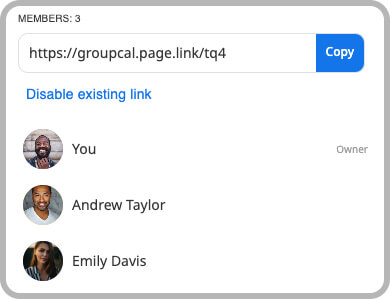
- Calendar Owner: The owner has complete access to the calendar and holds a permanent position. They are automatically designated as the default admin of the calendar, responsible for managing it.
- Calendar Admin: Admins also enjoy full access to the calendar and have the authority to make changes, such as converting it into a channel or requesting a verification badge. However, other admins can remove them from their admin role if needed.
- Calendar Member: Members have the privilege to view events on the calendar. However, their specific actions and permissions within the calendar are determined and controlled by the admins based on the permissions settings.
In GroupCal’s platform, multiple levels of permissions are available, including:
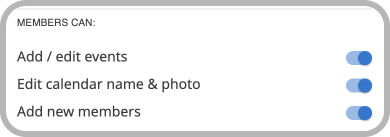
- View Events: This permission allows users to see all events in the shared calendar without the ability to edit or add new ones. While GroupCal does not have a direct “View Events” permission, administrators can control the members’ list of the calendar, effectively managing who has view access to the calendar. This feature is beneficial for businesses that need to restrict access to certain calendar details while fostering collaboration among team members.
- Add Events and Edit Events: Users with this permission can create and add new events to the shared calendar.
- Manage Members: This permission empowers designated individuals to control and add new members to the shared calendar.
- Admin Access: Admins have full control over the shared calendar, including managing permissions, changing settings, and configuring calendar preferences.
Members Identity
GroupCal prioritizes data security and privacy by implementing a dedicated identity verification process. Users are registered and identified based on their phone numbers, creating a stringent and robust authentication system. This approach ensures that only authorized individuals have access to the shared calendar, enhancing data security and preventing unauthorized access to sensitive information. By tying identities to phone numbers, GroupCal ensures that the right people have appropriate access to the calendar, providing an added layer of security and control over the shared calendar platform. With this advanced verification method, GroupCal empowers users to confidently collaborate and share information while maintaining the highest level of privacy and data protection.
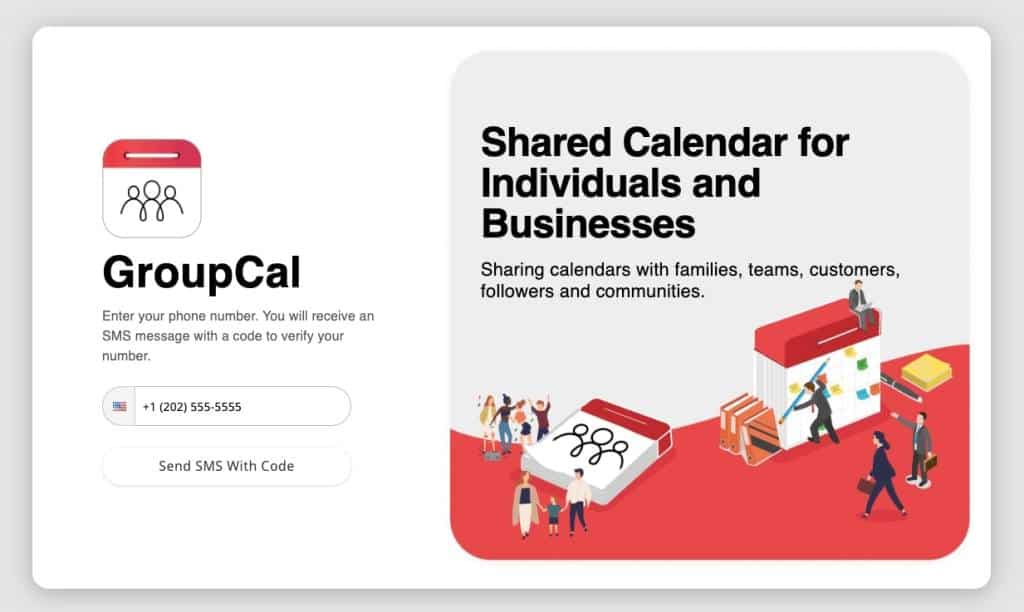
Fostering Efficient Collaboration
Permissions management in GroupCal plays a pivotal role in fostering a smooth and efficient collaboration process for businesses. By granting specific access levels to calendar members, businesses can ensure seamless coordination and communication across teams. Here’s how permissions management empowers businesses to optimize their collaboration process:
Streamlined Event Organization: GroupCal allows businesses to delegate responsibilities effectively. Calendar admins can assign different permissions to team members, enabling them to create, edit, or view events based on their roles and responsibilities. For instance, a project manager can have full editing rights, while team members can be given the ability to view events and participate in discussions. This delegation of responsibilities streamlines event organization and ensures that each team member has the necessary level of access to contribute efficiently.
Creating Subgroups and Specialized Teams: With GroupCal’s flexible permissions system, businesses can create subgroups and specialized teams within their shared calendar. By setting custom access levels for each subgroup, businesses can compartmentalize information and discussions. For example, a marketing department can have its own subgroup with exclusive access to marketing-related events, allowing them to plan and execute campaigns without cluttering the main calendar.
In another scenario, a sales team can have its dedicated calendar with read-only access to the marketing events, ensuring they are aware of upcoming campaigns and can align their sales strategies accordingly. This level of permissions customization enables businesses to tailor their shared calendar to meet specific collaboration needs and maintain focus within individual teams.
Conclusion
We have discussed how advanced permissions management in shared calendars plays a pivotal role in optimizing productivity, promoting smooth teamwork, and ensuring data security. GroupCal’s robust permissions system empowers businesses to tailor access levels, delegate responsibilities, and create specialized teams for efficient event organization. By leveraging GroupCal’s advanced permissions, businesses can enjoy enhanced collaboration, streamlined workflows, and improved communication across departments and teams.
The significance of data security cannot be overlooked, and GroupCal’s permissions management ensures sensitive information remains protected and accessible only to authorized individuals. With customizable permissions for admins and members, businesses can maintain control over their calendar data while fostering a collaborative environment.